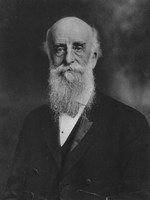 |
| May 18, 2024 |
Welcome! Click here to Login
|
 |
|
|


|
|
|
Click to visit the
Official Town Site
|
|
|
|
|
|
History: Lyman Abbott: A Voice at the Presbyterian Church

|
| Lyman Abbott |
A follower of the abolitionist preacher Henry Ward Beecher, Lyman Abbott was an intellectual who wrote frequently about religious issues and social ills in the mid-1800s.
After becoming an editor and Congregational minister, he moved to Cornwall-on-Hudson. Abbott turned down an invitation to become the pastor of the Canterbury Presbyterian church, but agreed to give sermons there – a practice he continued for 17 years.
A Portrait of Lyman Abbott from the archives of the Cornwall Presbyterian Church:
“Lyman Abbott, American, lawyer, clergyman and editor, was born in Roxbury, Mass. On December 18, 1835. His family had been dedicated to teaching, preaching, and writing ever since George Abbot came to Massachusetts from England around 1640. Family tradition tells of a great-grandson of George who took with him his Bible and hymn books and held daily morning worship for his workmen while building the road in the valley between the Kennebec and Connecticut Rivers.
Although Lyman was not a robust child, he was active and alert. His mother hoped that he would become a “Minister of God.” When he was seven, his mother died and his father moved the family to New York City where he founded the Abbott School for Girls. Lyman was sent to Massachusetts to live with his grandparents.
When not quite fourteen, he returned to New York and entered New York University. Graduating in 1853, he joined the law firm of his two older brothers, and in 1856 passed the bar examination.
An Outing up the Hudson Reveals its Enticing Beauty
He and his brothers enjoyed weekend hiking trips and in July 1855, when they went aboard a steam boat for a trip up the Hudson, his whole life changed. They had had no definite plans but, after the boat passed West Point, they were so charmed by the beautiful scenery that they got off at the next stop. When they asked if there would a place to stay overnight, the hackman replied, “Everybody in Cornwall takes boarders.”
They hiked back into the country for a few miles, stayed at a comfortable farmhouse, and kept discovering more beautiful “views” all the way back to the boat the next day. Afterwards, Lyman wrote to his fiancée that “he had found the place where you and I are going to have a country home!.”
Abbott Becomes a Minister
Despite his success with law and his happy marriage, he was restless, realizing that his true interest was in the ministry. He had been attending Plymouth Church in Brooklyn, feeling the influence of Henry Ward Beecher. With his wife consent, he left the law, studied, and in 1860 was ordained a Congregational minister.
He was pastor of a church in Terra Haute, Indiana until 1865 when he moved back to New York City to become an associate editor of the “Church Union,” later to become the “Outlook.” In 1887, Lyman Abbott became editor and chief, succeeding Henry Ward Beecher and also was chosen pastor of Plymouth Church.
Meanwhile, he and his family had been summering in Cornwall. In 1870, they bought a few acres at the top of a hill with a beautiful view of the mountains and the river and built their permanent home. By 1890 he was devoting all his time to the “Outlook” and to his writing and lecturing.
Church Flourishes When Abbott Preaches
The Canterbury Presbyterian Church asked him to be their pastor. He explained that he could not undertake pastoral duties with all his obligations, but would be willing to speak to them on Sunday until a regular pastor was found. This arrangement lasted for seventeen years and the congregation tripled under his leadership.
A few weeks before the golden anniversary of their happy marriage, Mrs. Abbott died. Lyman carried on for many more years, mentally and physically alert until the end, which came in October 1922. He had been an interpreter of three historic periods: the transition from agrarian to an urban industrialization; the Civil War; and the theory of evolution.
Lyman Abbott was a much loved and respected man. Among the tributes to him after his death was one from Charles Evens Hughes: ‘There is no one I have known who has had a beneficent influence.’”
Comments:
No comments have been posted.
Add a Comment:
Please signup or login to add a comment.
|
 |
|
|
|